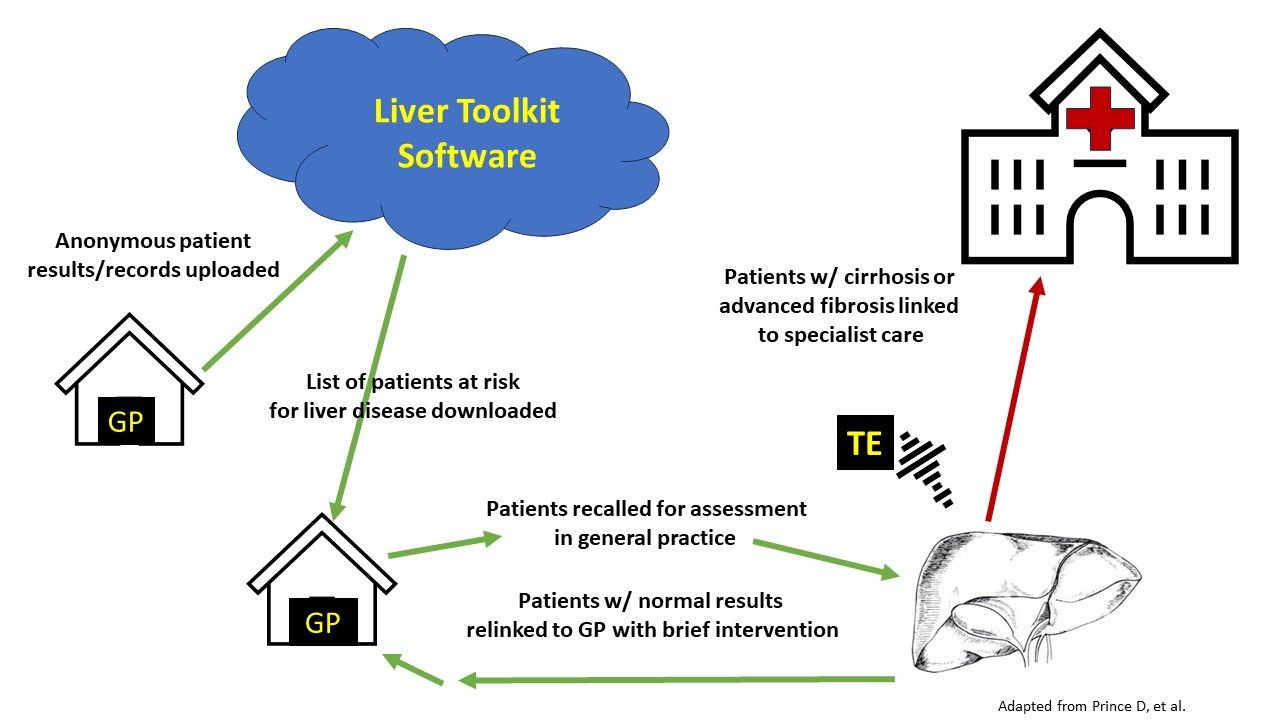- Clinical Technology
- Adult Immunization
- Hepatology
- Pediatric Immunization
- Screening
- Psychiatry
- Allergy
- Women's Health
- Cardiology
- Pediatrics
- Dermatology
- Endocrinology
- Pain Management
- Gastroenterology
- Infectious Disease
- Obesity Medicine
- Rheumatology
- Nephrology
- Neurology
- Pulmonology
Cloud-Based "Liver Toolkit" Identifies Primary Care Patients at High Risk for Fibrosis, Requiring Referral
One in 5 patients identified as at risk for advanced chronic liver disease had advanced fibrosis and PCP was prompted to refer to hepatology.
More than 1 in 5 adults in a large primary care cohort screened by a novel cloud-based technology for the risk of advanced chronic liver disease (ACLD) were found to have advanced fibrosis or cirrhosis, requiring referral to a specialist for ongoing care. Moreover, the technology, called “The Liver Toolkit” was better at detecting patients who required assessment in secondary care than general practitioners referring to the specialty team.
The findings were presented during an oral abstract session on advanced liver disease diagnostics and therapeutics at The Liver Meeting 2023, the annual scientific conference of the American Association for the Study of Liver Disease, November 10-14, 2023, in Boston, MA.
Described by study authors as “a cloud-based software solution,” the Liver Toolkit is designed to access primary care practice software and to extract data, including clinical history and pathology results, that can be used to characterize risk for ACLD. (See Figure below)
For the current study, data were culled to calculate aspartate aminotransferase to platelet ratio (APRI) and fibrosis 4 (FIB) scores for more than 32 000 adults across 9 general practices. Patients were excluded if they already had a diagnosis of cirrhosis. Patients who had elevated scores (APRI ≥ 1.0 and FIB-4 ≥ 3.25) or other risk factors for liver disease were recalled for additional assessment, including transient elastography (TE).
The Liver Toolkit identified 703 patients (2.2%) at high risk of ACLD. Of those, 179 (26%) were recalled for further assessment and 23 (13%) were identified as having advanced fibrosis or cirrhosis (liver stiffness measure ≥ 10.0 kPa; 10% indeterminate results, 25% early fibrosis, 52% normal).
Importantly, in nearly all cases, the diagnosis of liver disease was new, according to the study abstract. The most common etiology identified (83%) was non-alcoholic fatty liver disease [metabolic dysfunction-associated liver disease]. When toolkit accuracy for detection was compared with that of a general practitioner, the former outperformed the latter (22.9% vs 3.6%; P = .021).
Values for APRI (≥1.0) and FIB-4 (≥ 3.25) used by the toolkit software had a positive predictive value for detecting advanced fibrosis or cirrhosis of 20% and 24% respectively, study authors reported. They also noted that patients who did not return when recalled for additional assessment had markers of more severe disease with a higher median APRI score (0.46 vs 0.57, P =.041).
This novel information technology system successfully screened a large primary care cohort using existing pathology results to identity patients at increased risk of advanced chronic liver disease. More than one in five patients recalled were found to have liver disease needing ongoing specialist follow up.

